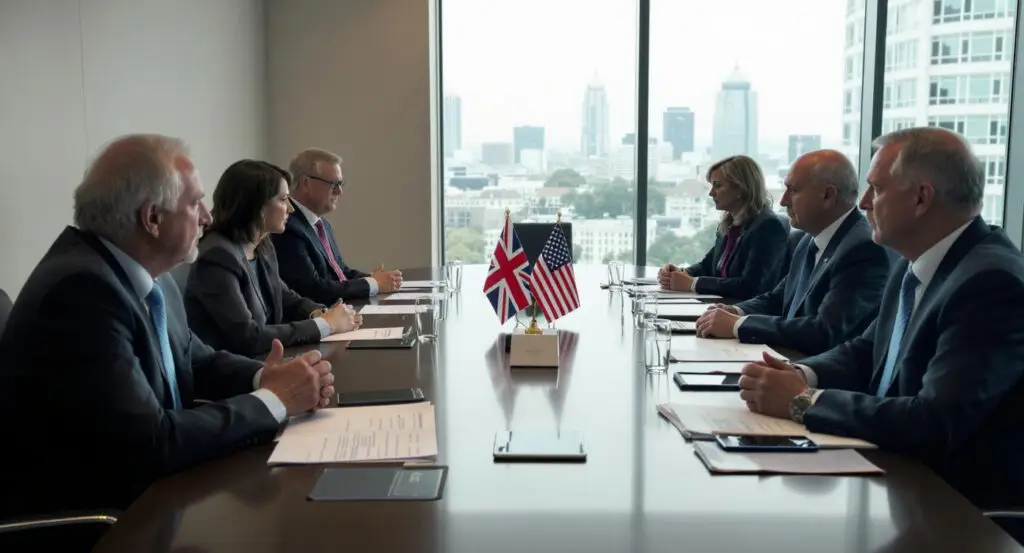The New UK Online Safety Act Ignites US Opposition
A growing number of U.S. politicians are speaking out against a new British law, the Online Safety Act, which went into effect on July 25. The bipartisan group of American lawmakers, including Vice President JD Vance and House Judiciary Chairman Jim Jordan, claims the law infringes on free expression and unfairly targets U.S.-based technology companies. Vice President Vance, who has been a vocal critic for months, reiterated his concerns during a recent trip to London, warning the U.K. against taking a “very dark path” of online “censorship.”
The law, passed by a previous Conservative government and implemented by the current Labour administration, is one of the most comprehensive national laws passed by a democracy to curtail potentially harmful content online in the name of children. This has created a significant political and diplomatic standoff, as the UK government and public largely support the law, while U.S. officials see it as a threat to fundamental freedoms and economic interests.
The Law’s Intent vs. Its Broad Impact
The U.K. Online Safety Act aims to prevent children from accessing harmful content online. To comply, internet companies are asking British users to verify their ages through ID photos, credit card providers, or age-check software. However, the law requires age-gating for content related to bullying, serious violence, dangerous stunts, and exposure to harmful substances.
This broad scope has led to unexpected restrictions on mainstream services, such as Reddit, which is now restricting access to pages like r/stopsmoking, r/STD, and r/aljazeera. This has led to a surge in the use of virtual private network (VPN) software in the U.K. to access unfiltered content.
The Free Speech and First Amendment Debate
U.S. politicians oppose the European Union’s regulation of online content, arguing that it threatens free speech and First Amendment rights. House Judiciary Chairman Jim Jordan, R-Ohio, believes that the law creates a chilling effect on free expression and threatens the core of Western democratic values.
He sees the law as a form of state overreach that could impact global internet regulation. This perspective highlights the fundamental philosophical difference between the U.S. approach to free speech and the U.K.’s interventionist approach to online safety, particularly concerning content accessible to minors.
Corporate Compliance and Non-Compliance
Tech companies in the UK have faced challenges in complying with a new age verification law, with some opting to implement strict measures and others opting out entirely. Microsoft has announced that Xbox users in the UK will receive notifications encouraging them to verify their age, with non-compliant users losing access to social features.
Discord is implementing new default settings that treat all UK users as minors unless they verify their age with a face scan or ID upload. However, far-right social media site Gab has refused to comply, blocking access to the UK. This highlights the challenges of enforcing a global law and the significant fines companies face for non-compliance.
A Political and Diplomatic Standoff
The issue is now poised to escalate, potentially playing out in a couple of different venues. The first is in the courts, where a U.S. lawyer, Preston Byrne, has said he plans to file a lawsuit soon on behalf of an unnamed client seeking to quash possible enforcement of the British law within the United States. The second venue is in trade negotiations, where President Donald Trump may decide to press the issue with British politicians, although British Culture Secretary Lisa Nandy has already stated that the U.K. “would not make any changes to the Online Safety Act as part of trade negotiations.”
This stance by the Labour-led government, which has strong support for the law among the British public (69% in a YouGov poll), sets the stage for a diplomatic standoff. The law was passed during a previous, Conservative-led government, but its implementation and defence by the current Labour government show its broad political support in the U.K., making it a difficult issue for U.S. politicians to sway.
The Broader Debate on Internet Regulation
The debate over the U.K.’s Online Safety Act is a microcosm of a much larger global conversation about internet regulation, children’s safety, and the limits of free speech in the digital age. American privacy advocates are watching the debate play out with alarm, concerned that similar age verification laws could upend the internet in the U.S. and elsewhere. Paige Collings, a senior speech and privacy activist at the Electronic Frontier Foundation, argued that “Young people should be able to access information, speak to each other and to the world, play games, and express themselves online without the government making decisions about what speech is permissible.”
This perspective highlights the ongoing tension between a desire for a safer online environment and the fundamental principles of an open and unrestricted internet. The outcome of this political and legal battle will not only determine the fate of the U.K. law but could also set a significant precedent for how other countries approach the complex challenge of regulating the internet in the years to come.
Read More: Youth Political Disengagement: A Growing Generational Gap in U.S. Politics























